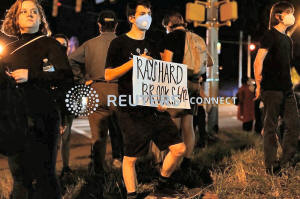Atlanta prosecutors hope to persuade jury to second-guess officer who
shot Brooks
 Send a link to a friend
Send a link to a friend
 [June 18, 2020]
By Tom Hals [June 18, 2020]
By Tom Hals
(Reuters) - Prosecutors seeking to convict
Atlanta police officer Garrett Rolfe for murder in the shooting death of
Rayshard Brooks must try to persuade jurors to do something they rarely
do - second guess split-second police decisions.
On Wednesday, Fulton County District Attorney Paul Howard brought 11
charges against Rolfe, with the most serious being felony murder which
carries the death penalty.
Atlanta's mayor fired Rolfe after Friday's shooting. Civil rights groups
were quick to condemn the lethal methods. Protests broke out in the city
as the shooting fueled popular outrage that followed the May 25 death of
another unarmed black man, George Floyd, as an officer knelt on his neck
during his arrest in Minnesota.
Video of the shooting that went viral will likely help the prosecution,
and Howard noted that Devin Brosnan, Rolfe's partner, agreed to become
the rare police officer who will testify against a colleague.

Prosecutors will stress that the officer shot Brooks in the back as he
fled, and insist that the suspect posed no threat. Defense attorneys
will likely note that Brooks took the officer's Taser, or stun gun, and
brandished it before he fled.
Steve Gaynor, president of the Fraternal Order of Police in Cobbs County
in Georgia, insisted that Rolfe's actions were justified under U.S.
Supreme Court guidance.
"Look at case law. The officer is well within his right to use deadly
force," said Gaynor.
Laws governing police use of force differ by state, but the Supreme
Court has said deadly force can be used if an officer reasonably
believes the suspect poses an immediate threat of serious injury to the
officer or others.
Georgia allows use of deadly force to apprehend a suspect when officers
have probable cause to believe the suspect committed a crime involving
infliction or threatened infliction of serious harm, which Gaynor said
Brooks had done.
He said Brooks committed assault on the officers, a robbery when he
seized the stun gun and aggravated assault when fired the stun gun at
the officers.
[to top of second column]
|

Protesters rally against racial inequality and the police shooting
death of Rayshard Brooks, in Atlanta, Georgia, U.S. June 13, 2020.
REUTERS/Elijah Nouvelage/File Photo

Howard, the district attorney, said Brooks posed no threat as he was
fleeing because he had discharged the available shots from the stun
gun. Gaynor disagreed.
"Itís still a weapon, maybe not a deadly weapons but it is a weapon.
The public is still in jeopardy at that point," said Gaynor.
Rolfe's defense attorney could also argue that he followed police
training protocols. Jack Ryan, who trains law enforcement
nationwide, said some police departments teach officers to consider
using deadly force if a suspect has gained control of an officer's
stun gun. However, that is less of a threat when there are multiple
officers present.
The Atlanta police department did not respond to a request for
comment on its training.
Ultimately, like most cases against police, legal experts said it
could come down to whether a jury is willing to defer to an
officer's version of events.
Jonathan Rapping, president of the public defender group Gideon's
Promise in Atlanta, said white jurors in such cases often tend to
exaggerate threats posed by minority suspects.
"We're reluctant to second-guess police," said Rapping, who is a
professor at John Marshall Law School.

For that reason, having testimony from Rolfe's partner Brosnan could
be key for prosecutors.
Sam Starks, an Atlanta criminal defense attorney, said obtaining the
cooperation of the other officer was a surprise and "makes it harder
for Rolfe."
(Reporting by Tom Hals in Wilmington, Delaware; Editing by Noeleen
Walder and David Gregorio)
[© 2020 Thomson Reuters. All rights
reserved.] Copyright 2020 Reuters. All rights reserved. This material may not be published,
broadcast, rewritten or redistributed.
Thompson Reuters is solely responsible for this content. |